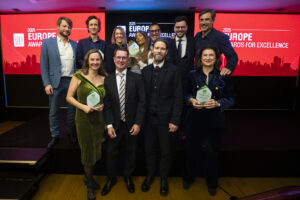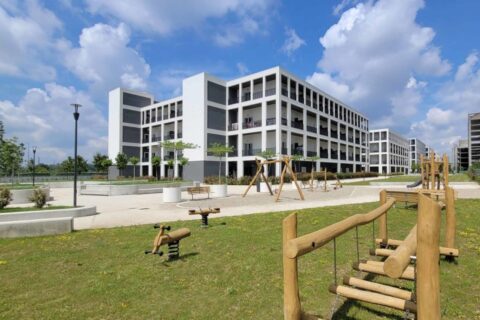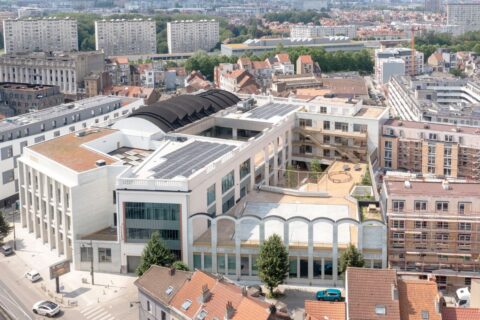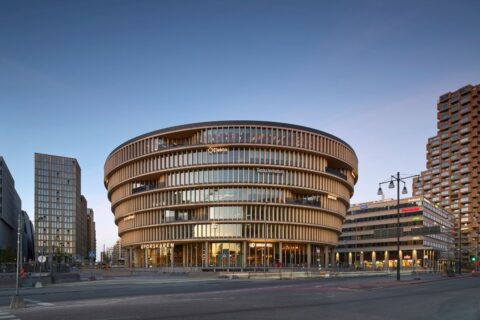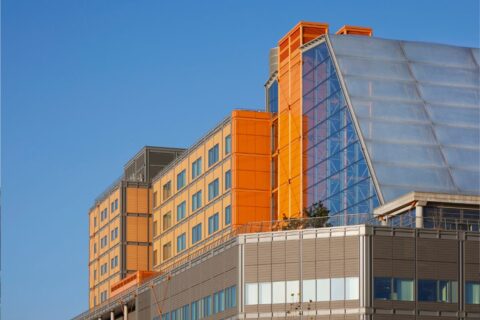5Square
Four outstanding built environment projects named the winners of the 2025 ULI Europe Awards for Excellence
November 27, 2025
This week, four exemplary real estate projects were named the overall winners of the 2025 Urban Land Institute (ULI) Europe Awards for Excellence from this year’s ten finalists. The diverse winning projects include a social housing project in Milan situated on an abandoned office development site, a new secondary school in Brussels developed in a former brewery, a new flexible life sciences hub in Stockholm, and an acute healthcare facility in Birmingham which is intended as a catalyst for community regeneration.
Celebrating the highest standards of achievement in land use practice across the whole development process, projects can be submitted in the annual awards from the private, public, and non-profit sectors, and must be in an EMEA country, financially viable and significantly implemented. All entries are evaluated by an expert jury across a range of criteria, including planning, architecture and design, construction, financial viability, management, sustainability and resiliency, and community impact.
All four winning projects were announced at a celebratory ULI Europe Awards for Excellence dinner held during the C Change Summit in Paris, and include:
5Square, Milan, Italy (Developer: Redo SGR; Owner: Fondo Immobiliare di Lombardia – Comparto Uno; Architect: Barreca & La Varra and Fondazione Housing Sociale). A social housing project of circa 10,000 sqm situated on a previously unfinished and abandoned commercial complex, repurposing five structures with the aim of creating a vibrant social housing community supported by shared amenities. The jury noted that 5Square constitutes a residential community reborn from abandonment into a circular, affordable, inclusive community. (Category: Residential).
Egied van Broeckhovenschool, Molenbeek-Saint-Jean, Belgium (Developer: Vzw Ignatius Scholen in Beweging (school group) and PREO (project director); Architects: B2Ai architects, B2Ai interior design, and Stefaan Thiers (landscaping); A new secondary school for 860 pupils created in the former Vandenheuvel Brewery bottling plant, which has been converted and refurbished with high social, urban, educational and sustainable ambitions. The project aims to retain its architectural heritage and integrate into the urban fabric of a densely populated, socially deprived area. The jury appreciated the school for transforming a site in a neglected neighbourhood into a place of pride and possibility. (Category: Education).
Forskaren, Stockholm, Sweden (Developer: Vectura; Architect: 3XN); A new 24,000 sqm development located in the Hagastaden health and life sciences district. The circular building is intended as a hub containing flexible work environments including offices, co-working and laboratories, two public restaurants and exhibition space. It is designed as a vertical life sciences village that aims to encourage connection and collaboration between industry, research, and academia, situated in an open environment. The jury praised how the round building interacts with the public realm, sustaining community engagement by inviting people in to explore, with many areas open to the public including the atrium where science is openly on display, plus ground floor restaurants and an exhibition space. (Category: Other/Labs).
Midland Metropolitan University Hospital, Birmingham, UK (Owners: Sandwell and West Birmingham Hospitals NHS Trust; Architects: HKS, Cagni Williams, Sonnemann Toon); A purpose built acute health care facility aiming to deliver a new standard for clinical healthcare design and act as a catalyst for community regeneration in an area of high deprivation. Comprising emergency, maternity, children’s and adult acute services, the design is intended to maximise useable floor space and adapt to changes in health care and community needs. The jury highlighted that it is a hospital that redefines what it means to heal, where architecture itself promotes recovery. (Category: Other/Healthcare).
The expert jury, featuring leaders from across the built environment, includes: Simone Santi, Director & Founder, VeO (Italy) and Chair of the 2025 ULI Europe Awards for Excellence Jury; Sébastien Chemouny, Directeur Général, Ofi Invest Real Estate SAS (France); Xavier Denis, Founder, Castlight (Belgium); Brigit Gerritse, General Manager, Dutch Green Building Council (Netherlands); Émilie Jaskula, Global Head of Offices, AXA IM – Real Assets (France) Jorge Pérez de Leza Eguiguren, CEO, Metrovacesa, S.A. (Spain); Ajay Phull, Managing Director, Real Estate at La Caisse (CDPQ); Katia Polidoro, Principal Director, TP Bennett, LLP (UK); Simone Pozzato, Senior Managing Director, Hines Europe Ltd (UK); Dan Ringelstein, Director – Master Planning and Urban Design, Arup (UK); and, Prof. Jörn Walter, Chief Building Director, HafenCity University and former Chief Planning Director, City of Hamburg (Germany).
“We’ve had a record number of incredibly high standard entries in the awards this year, and it has been extremely difficult for the jury to select our four overall winners from among this year’s inspiring shortlist of built environment project”, said Simone Santi, Chair of the 2025 ULI Europe Awards for Excellence Jury. “Our winners all certainly push the envelope, featuring groundbreaking healthcare, laboratory, education and residential projects. All demonstrate bold thinking in what is possible to achieve in urban development, and all of them are worthy of our celebration. My very best wishes and congratulations to all our winners in this year’s competition.”
Anne Kavanagh, ULI Europe Chair, said, “Once again we’re celebrating a range of truly excellent real estate projects that are all acting as catalysts to positively impact local communities across Europe, creating vibrant and inspiring new environments that we can all learn from. My congratulations to all our winners and finalists this year.”
Lisette van Doorn, CEO, ULI Europe, concludes, “Since they began, our awards have formed a vast repository of excellence in tackling some of society’s biggest challenges, showcasing a high standard of best practice in project delivery that we can learn from and be inspired by. That also goes for this year’s winners, focused on regeneration, affordable housing, healthcare and life sciences and education, tied together by a common focus on social equity, community engagement, and innovation to drive economic opportunities. It shows once again that great things are happening and there is much to learn from these great examples. I would like to congratulate not only our winners but also all our finalists and thank everyone who entered the awards this year and of course thank our distinguished jury for their hard work this year in reviewing all entries and selecting our winners.”
For further information about the competition, each winner and project images, please visit the ULI Europe Awards for Excellence website.
Ends
Press contact: Tony Nokling: [email protected]
Notes to editors:
ULI Europe Awards for Excellence
The ULI Europe Awards for Excellence recognises superior development efforts in the private, public, and non-profit sectors. Projects and programmes are evaluated against rigorous, multi-faceted criteria, with entries required to demonstrate: market acceptance/financial success; leadership through excellence in areas including architecture, design, planning, construction, amenities, economics, and management; relevance to current and future community requirements; a positive impact in their communities and/or immediate context; environmental sustainability, stewardship, and resiliency; and provide models, lessons, strategies, or techniques that can be replicated in or adapted to other communities. Visit: ULI Europe Awards for Excellence.
The Urban Land Institute:
The Urban Land Institute is a non-profit education and research institute supported by its members. Its mission is to shape the future of the built environment for transformative impact in communities worldwide. Established in 1936, the institute has over 48,000 members worldwide representing all aspects of land use and development disciplines.
In Europe ULI has over 5,500 members across 15 National Council country networks. Visit: europe.uli.org
